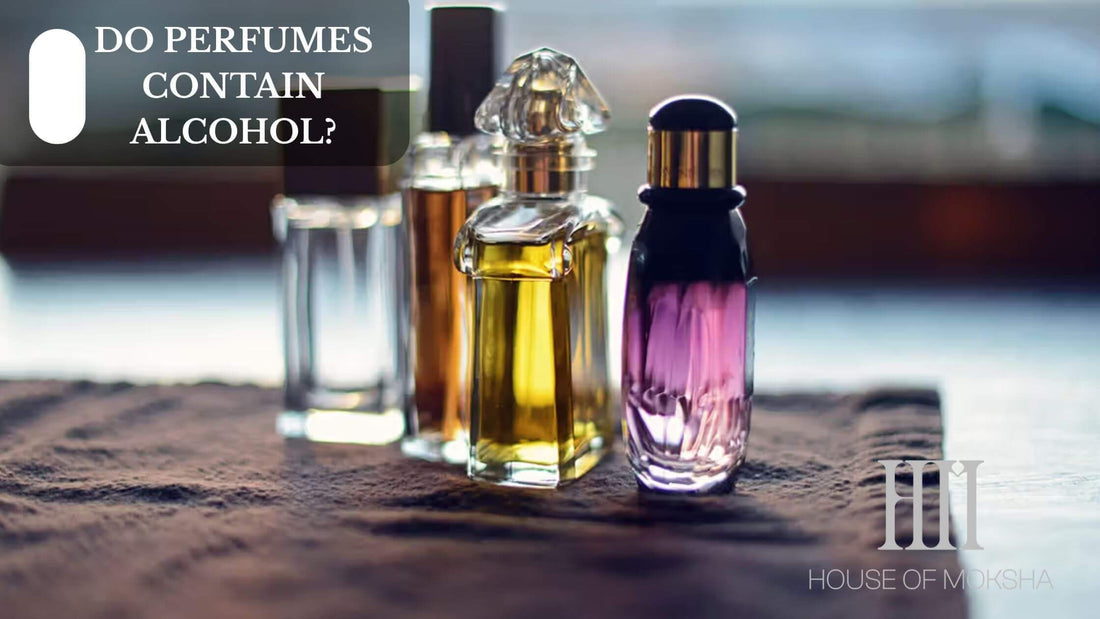
DO PERFUMES CONTAIN ALCOHOL?
Share

WHAT EXACTLY IS ALCOHOL IN PERFUME?
Almost all fragrances utilize alcohol as one of their key ingredients since it serves as the main solvent that blends and preserves the diverse aromatic components of a fragrance. In perfumery, alcohol is known to serve as a good carrier of scent molecules. When the perfume is sprayed or applied, the alcohol evaporates, allowing the fragrance to be released adequately, progressing through its top, middle, and base notes in a balanced and harmonious manner.
This process is highly important for transforming the perfume’s scent over time. Besides enhancing the projection and longevity of the scent, alcohol acts as an antiseptic, increasing the longevity of the fragrance by aiding in the protection against microbial contamination, as well.
The rapid evaporation of alcohol, however, can produce a momentary cooling or tingling sensation on the skin, which some users, particularly those with sensitive skin, may perceive as irritating. Awareness of the role of alcohol helps to appreciate the use of it in perfumes, but also explains the reason why alternatives without alcohol exist.
HOW DOES ALCOHOL AFFECT THE SCENT PROFILE?
Aromatic spirits are critical to the scent structure of a perfume. Being a volatile solvent, alcohol is a perfume's carrier since it evaporates rapidly along with the fragrance molecules within it; this allows the scent to spread smoothly over the skin. The rapid evaporation of alcohol not only aids in the projection and diffusion of the perfume but also in the way subsequent notes are revealed over time.
The essence of alcohol perfume can be described as exploding with fresh fragrant notes at the onset, which surely smells delicate and gentle. In addition to the top notes, if alcohol is light on perfume, then the heart notes and the lasting fixative elements emerge more dominantly. As such, alcohol enhances the scope of liquid mediums, adding to the multidimensional aspects of evolution in a scentscape and perfume journey. However, because alcohol is volatile, perfumes tend to appear sharp, intense, and overwhelming due to high alcohol content.
Ozonic alcohol easily blends with other hyper-delicate notes, either changing the gentle exchange between feathery strands of sound into something bold or brutally amplifying the sensuousness of the tremulous fabric of whispers that is hidden beneath the surface. This results in an alteration of the perception of fragile notes with slight enhancement or muting, as determined by the formulation. Generally, alcohol offers countless lies for stripping delicate notes hidden under the surface, granting a wide variety of compelling scents one has to peel away the layers of intrigue to savor.
TYPES OF ALCOHOL USED IN PERFUME
Knowing the various sorts of alcohol used in fragrances lets you make better decisions, especially if you have delicate skin or want alcohol-free alternatives.
Perfumes usually contain ethanol (also called ethyl alcohol), a food-grade alcohol of high purity, serving as a solvent to dissolve fragrance oils and aiding even scent dispersion during spraying. Upon use, ethanol evaporates fast, letting the scent naturally develop on your skin.
Apart from pure ethanol, some perfumes have denatured alcohol, ethanol mixed with ingredients to make it undrinkable. The cosmetics business makes substantial use of this sort of alcohol because of its cost-effectiveness and potency. Although denatured alcohol can occasionally irritate dryness or sensitivity in individuals, it is great for carrying a scent.
Additionally, acting as solvents and preservatives, other alcohols you could stumble upon are benzyl alcohol and SD alcohol (special denatured alcohol). Compared to conventional denatured alcohol, these alcohols are milder on the skin.
PROS AND CONS OF ALCOHOL-BASED PERFUMES
- Alcohol provides one of the best benefits in this regard since it can smoothly dissolve fragrance oils and assist in evenly distributing the smell when rubbed on the skin.
- Your fragrance may project well and fill the environment with your chosen scent due to a more immediate and energetic smell release. Further, the perfume settles gently without creating a greasy stain since alcohol evaporates fast.
- Still, one should weigh the drawbacks of perfumes made from alcohol. For those with sensitive or dry skin, the alcohol might occasionally irritate, redden, or dry the skin, especially if used often or in great quantity. Alcohol's drying impact could irritate or worsen present skin diseases since it might strip away natural oils. Moreover, the high flammability of alcohol mandates that you exercise care in the way and place you store and use these fragrances.
- Still, thanks to their durability, powerful projection, and cost, alcohol-based perfumes are in demand. Given your skin type and personal tastes, it is vital to balance these advantages and drawbacks. Alcohol-free alternatives are becoming more popular among those looking for milder alternatives since they provide fragrant experiences without the possible negative effects associated with alcohol content.
ALCOHOL-FREE PERFUMES: A SAFER ALTERNATIVE?

Especially among those with sensitive skin or a preference for more natural products, alcohol-free perfume options have become quite popular in recent years. Alcohol-free alternatives depend on other bases such as oils, water, or silicone, unlike conventional perfumes that use alcohol as a carrier to spread fragrance oils. These options may provide a milder treatment for the skin, therefore lowering the chances of allergies, dryness, or irritation usually linked with alcohol-based scents.
For example, oil-based scents often have a more complex character and may have a longer-lasting aroma since the oils serve to lock the scent on your skin. Furthermore attractive to those looking for clean beauty alternatives, many alcohol-free scents also include natural and botanical elements. However, it is significant to realize that alcohol-free perfumes might have somewhat different scent projections and longevity than their alcohol-free equivalents. Their more subdued and close-to-the-skin odor experience is sometimes preferred.
HOW ARE ALCOHOL-FREE PERFUMES FORMULATED?
While still providing a mesmerizing and long-lasting fragrance experience, alcohol-free scents are made using alternative bases that substitute the traditional alcohol ingredient. These scents frequently utilize carrier oils like jojoba oil, fractionated coconut oil, or sweet almond oil in place of alcohol, which both serve as a solvent for the fragrance oils and have moisturizing properties for the skin. Compared to their alcohol-based alternatives, these oil-based formulas sometimes have a wealthier, creamier consistency and provide a more gradual, more subtle scent release.
Apart from oils, some alcohol-free fragrances use water-based or silicone-based formulae meant to be mild and appropriate for sensitive skin types. To preserve the longevity and integrity of the fragrance components, these substitutions frequently include natural stabilizers and emulsifiers. Alcohol-free fragrances might need somewhat different mixing techniques to get the intended projection and staying power since alcohol is a natural evaporator that aids in quick scent dispersal.
The creation of alcohol-free fragrances entails meticulous choosing of top-quality essential oils, absolutes, and aroma compounds to guarantee a sophisticated and pleasurable scent profile.
HOM is proud of being genuinely Indian from idea to production, unlike many other Indian perfume lines that depend on Chinese or imported fragrance concentrates. Part of the Moksha Group, one of India's top producers of natural essential oils, extracts, and ingredients for perfumery, our legacy is steeped in authenticity, sustainability, and quality. With years of knowledge of natural components, we produce fragrances different and reflective of India's abundant olfactory heritage.
Indian-origin ingredients are centrally placed in every scent HOM, deftly mixed with European sophistication and Arabic depth. This strategy produces extremely Indian but internationally inspired scents. Our ability to create every fragrance from nothing stems from our in-house laboratory and perfumery R&D lab, which is state-of-the-art. From selecting the best natural elements to mixing them with renewable source fragrance solvents and fixatives, we guarantee that all our processes correspond with our standards of ethics, sustainability, and quality. HOM perfumes offer an experience rather than only fragrances. Since every work is made with care, 100% vegan, cruelty-free, and suitable for those looking for luxury with a conscience, it is ideal for.
